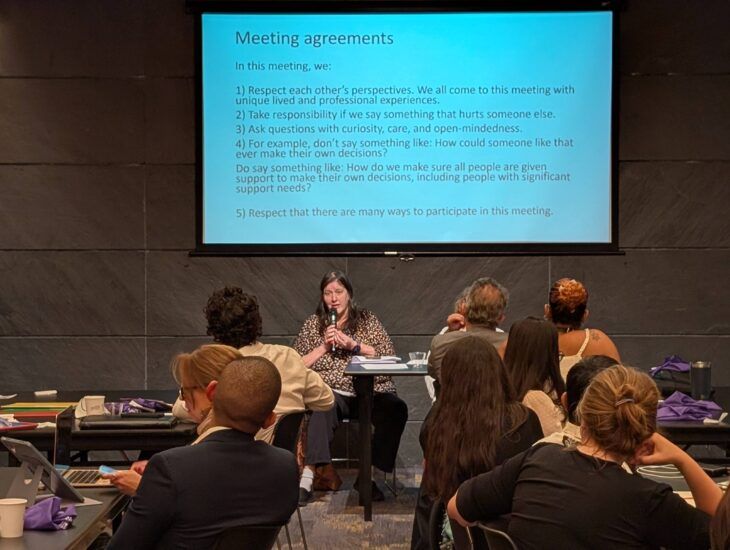Blog
Talking to governments about sexual and reproductive health choices
- Inclusive health
Everyone should have the right to make their own decisions about their sexual and reproductive health – and we are working with Women Enabled International to make sure that governments and other decision makers are talking about it.
We brought the conversation about making sexual and reproductive health choices to the United Nations, so governments could hear from self-advocates about what matters.
At the United Nations headquarters in New York from June 10 to June 12, government officials came together for the 18th annual session of COSP.

At COSP, government officials from countries that have signed the CRPD (the Convention on the Rights of Persons with Disabilities) meet. They talk about making things better for people with disabilities all over the world.
At COSP18, Inclusion International, Women Enabled International, and some of our members held a workshop to share our work on sexual and reproductive health.
The workshop was part of our Legal Capacity Project, which is about how women make choices about their sexual and reproductive health in different countries.
Last year, we worked with project partners to run focus groups with women with disabilities about making decisions about their bodies, relationships, and marriage. These focus groups were co-led by self-advocates. The focus groups included women with intellectual disabilities and psychological disabilities from five different countries: the USA, Kenya, Uganda, Spain, and Fiji.
During the focus groups, my job was to help make sure that the questions we asked at the focus groups were easy to understand. I also worked with Diana, another self-advocate from SABE, to lead the focus group in Ohio, USA.
At COSP, we wanted governments and decision-makers to hear from us about what the women in the focus group told us.
What did we share about the project at COSP?
In this workshop, people from governments, organizations of persons with disabilities (OPDs), and organizations working on sexual and reproductive health learned about sexual and reproductive rights directly from women with intellectual disabilities and psychosocial disabilities.
Firstly, we shared some information about the project, especially how we made sure that women with intellectual and psychosocial disabilities were leaders of this work, using the Listen Include Respect guidelines.
We shared stories that women told us in the focus groups and invited participants to talk about different ways that the right to legal capacity is violated.
Then, participants broke into small groups to talk about how we can make sure that women with disabilities are able to make their own decisions about their sexual and reproductive health.
Different small groups talked about different topics:
- Some groups talked about how to change laws and policies to make sure women’s right to make decisions is respected.
- Some groups talked about how to make sure women’s right to make decisions is respected in healthcare settings, like when they go to see a gynecologist.
- Some groups talked about how to make sure that organizations working on sexual and reproductive health and rights and organizations working on the right to legal capacity work together.
I think that some of the most important ideas I heard were to keep sharing stories about this important topic, and to make sure that women with intellectual disabilities and psychosocial disabilities are leaders of work about the right to legal capacity.
What will we do next?
This year, we are supporting Women Enabled International to write a report about legal capacity and sexual and reproductive health.
The report will share what we learnt from the focus groups, and make recommendations about how we can make sure women all over the world can make their own decisions. We will use what we heard at our workshop at COSP to help us to shape these recommendations.
There will be 2 versions of this report – a technical report (for organisations that do work about legal capacity and lawmakers working to change guardianship laws) and an accessible report (for everyone, including people with and without disabilities).
Just like the other work that the project has done so far, the development of this report is being led by women with intellectual disabilities through a self-advocate reference group.
I chair this reference group, which is made up of self-advocates who led the focus groups with women with intellectual disabilities in Kenya, the USA and Spain in 2024.
We are working together to:
- Advise the project about what data and recommendations from the focus group should go in the report
- Review the structure of the technical report and give feedback
- Plan the structure and format of the accessible report
- Give feedback about the language of the accessible report
- Choose the illustrations that will be used in the accessible report
We are looking forward to sharing the report in October 2025.